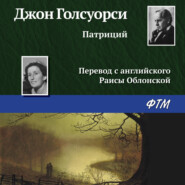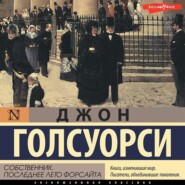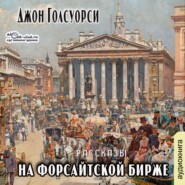По всем вопросам обращайтесь на: info@litportal.ru
(©) 2003-2024.
✖
The Forsyte Saga - Complete
Настройки чтения
Размер шрифта
Высота строк
Поля
“I should like,” said young Jolyon, “to lecture on it:
“Properties and quality of a Forsyte: This little animal, disturbed by the ridicule of his own sort, is unaffected in his motions by the laughter of strange creatures (you or I). Hereditarily disposed to myopia, he recognises only the persons of his own species, amongst which he passes an existence of competitive tranquillity.”
“You talk of them,” said Bosinney, “as if they were half England.”
“They are,” repeated young Jolyon, “half England, and the better half, too, the safe half, the three per cent. half, the half that counts. It’s their wealth and security that makes everything possible; makes your art possible, makes literature, science, even religion, possible. Without Forsytes, who believe in none of these things, and habitats but turn them all to use, where should we be? My dear sir, the Forsytes are the middlemen, the commercials, the pillars of society, the cornerstones of convention; everything that is admirable!”
“I don’t know whether I catch your drift,” said Bosinney, “but I fancy there are plenty of Forsytes, as you call them, in my profession.”
“Certainly,” replied young Jolyon. “The great majority of architects, painters, or writers have no principles, like any other Forsytes. Art, literature, religion, survive by virtue of the few cranks who really believe in such things, and the many Forsytes who make a commercial use of them. At a low estimate, three-fourths of our Royal Academicians are Forsytes, seven-eighths of our novelists, a large proportion of the press. Of science I can’t speak; they are magnificently represented in religion; in the House of Commons perhaps more numerous than anywhere; the aristocracy speaks for itself. But I’m not laughing. It is dangerous to go against the majority and what a majority!” He fixed his eyes on Bosinney: “It’s dangerous to let anything carry you away — a house, a picture, a — woman!”
They looked at each other. — And, as though he had done that which no Forsyte did — given himself away, young Jolyon drew into his shell. Bosinney broke the silence.
“Why do you take your own people as the type?” said he.
“My people,” replied young Jolyon, “are not very extreme, and they have their own private peculiarities, like every other family, but they possess in a remarkable degree those two qualities which are the real tests of a Forsyte — the power of never being able to give yourself up to anything soul and body, and the ‘sense of property’.”
Bosinney smiled: “How about the big one, for instance?”
“Do you mean Swithin?” asked young Jolyon. “Ah! in Swithin there’s something primeval still. The town and middle-class life haven’t digested him yet. All the old centuries of farm work and brute force have settled in him, and there they’ve stuck, for all he’s so distinguished.”
Bosinney seemed to ponder. “Well, you’ve hit your cousin Soames off to the life,” he said suddenly. “He’ll never blow his brains out.”
Young Jolyon shot at him a penetrating glance.
“No,” he said; “he won’t. That’s why he’s to be reckoned with. Look out for their grip! It’s easy to laugh, but don’t mistake me. It doesn’t do to despise a Forsyte; it doesn’t do to disregard them!”
“Yet you’ve done it yourself!”
Young Jolyon acknowledged the hit by losing his smile.
“You forget,” he said with a queer pride, “I can hold on, too — I’m a Forsyte myself. We’re all in the path of great forces. The man who leaves the shelter of the wall — well — you know what I mean. I don’t,” he ended very low, as though uttering a threat, “recommend every man to-go-my-way. It depends.”
The colour rushed into Bosinney’s face, but soon receded, leaving it sallow-brown as before. He gave a short laugh, that left his lips fixed in a queer, fierce smile; his eyes mocked young Jolyon.
“Thanks,” he said. “It’s deuced kind of you. But you’re not the only chaps that can hold on.” He rose.
Young Jolyon looked after him as he walked away, and, resting his head on his hand, sighed.
In the drowsy, almost empty room the only sounds were the rustle of newspapers, the scraping of matches being struck. He stayed a long time without moving, living over again those days when he, too, had sat long hours watching the clock, waiting for the minutes to pass — long hours full of the torments of uncertainty, and of a fierce, sweet aching; and the slow, delicious agony of that season came back to him with its old poignancy. The sight of Bosinney, with his haggard face, and his restless eyes always wandering to the clock, had roused in him a pity, with which was mingled strange, irresistible envy.
He knew the signs so well. Whither was he going — to what sort of fate? What kind of woman was it who was drawing him to her by that magnetic force which no consideration of honour, no principle, no interest could withstand; from which the only escape was flight.
Flight! But why should Bosinney fly? A man fled when he was in danger of destroying hearth and home, when there were children, when he felt himself trampling down ideals, breaking something. But here, so he had heard, it was all broken to his hand.
He himself had not fled, nor would he fly if it were all to come over again. Yet he had gone further than Bosinney, had broken up his own unhappy home, not someone else’s: And the old saying came back to him: ‘A man’s fate lies in his own heart.’
In his own heart! The proof of the pudding was in the eating — Bosinney had still to eat his pudding.
His thoughts passed to the woman, the woman whom he did not know, but the outline of whose story he had heard.
An unhappy marriage! No ill-treatment — only that indefinable malaise, that terrible blight which killed all sweetness under Heaven; and so from day to day, from night to night, from week to week, from year to year, till death should end it.
But young Jolyon, the bitterness of whose own feelings time had assuaged, saw Soames’ side of the question too. Whence should a man like his cousin, saturated with all the prejudices and beliefs of his class, draw the insight or inspiration necessary to break up this life? It was a question of imagination, of projecting himself into the future beyond the unpleasant gossip, sneers, and tattle that followed on such separations, beyond the passing pangs that the lack of the sight of her would cause, beyond the grave disapproval of the worthy. But few men, and especially few men of Soames’ class, had imagination enough for that. A deal of mortals in this world, and not enough imagination to go round! And sweet Heaven, what a difference between theory and practice; many a man, perhaps even Soames, held chivalrous views on such matters, who when the shoe pinched found a distinguishing factor that made of himself an exception.
Then, too, he distrusted his judgment. He had been through the experience himself, had tasted too the dregs the bitterness of an unhappy marriage, and how could he take the wide and dispassionate view of those who had never been within sound of the battle? His evidence was too first-hand — like the evidence on military matters of a soldier who has been through much active service, against that of civilians who have not suffered the disadvantage of seeing things too close. Most people would consider such a marriage as that of Soames and Irene quite fairly successful; he had money, she had beauty; it was a case for compromise. There was no reason why they should not jog along, even if they hated each other. It would not matter if they went their own ways a little so long as the decencies were observed — the sanctity of the marriage tie, of the common home, respected. Half the marriages of the upper classes were conducted on these lines: Do not offend the susceptibilities of Society; do not offend the susceptibilities of the Church. To avoid offending these is worth the sacrifice of any private feelings. The advantages of the stable home are visible, tangible, so many pieces of property; there is no risk in the statu quo. To break up a home is at the best a dangerous experiment, and selfish into the bargain.
This was the case for the defence, and young Jolyon sighed.
‘The core of it all,’ he thought, ‘is property, but there are many people who would not like it put that way. To them it is “the sanctity of the marriage tie”; but the sanctity of the marriage tie is dependent on the sanctity of the family, and the sanctity of the family is dependent on the sanctity of property. And yet I imagine all these people are followers of One who never owned anything. It is curious!
And again young Jolyon sighed.
‘Am I going on my way home to ask any poor devils I meet to share my dinner, which will then be too little for myself, or, at all events, for my wife, who is necessary to my health and happiness? It may be that after all Soames does well to exercise his rights and support by his practice the sacred principle of property which benefits us all, with the exception of those who suffer by the process.’
And so he left his chair, threaded his way through the maze of seats, took his hat, and languidly up the hot streets crowded with carriages, reeking with dusty odours, wended his way home.
Before reaching Wistaria Avenue he removed old Jolyon’s letter from his pocket, and tearing it carefully into tiny pieces, scattered them in the dust of the road.
He let himself in with his key, and called his wife’s name. But she had gone out, taking Jolly and Holly, and the house was empty; alone in the garden the dog Balthasar lay in the shade snapping at flies.
Young Jolyon took his seat there, too, under the pear-tree that bore no fruit.
CHAPTER XI — BOSINNEY ON PAROLE
The day after the evening at Richmond Soames returned from Henley by a morning train. Not constitutionally interested in amphibious sports, his visit had been one of business rather than pleasure, a client of some importance having asked him down.
He went straight to the City, but finding things slack, he left at three o’clock, glad of this chance to get home quietly. Irene did not expect him. Not that he had any desire to spy on her actions, but there was no harm in thus unexpectedly surveying the scene.
After changing to Park clothes he went into the drawing-room. She was sitting idly in the corner of the sofa, her favourite seat; and there were circles under her eyes, as though she had not slept.
He asked: “How is it you’re in? Are you expecting somebody?”
“Yes that is, not particularly.”
“Who?”
“Mr. Bosinney said he might come.”
“Bosinney. He ought to be at work.”
To this she made no answer.
“Well,” said Soames, “I want you to come out to the Stores with me, and after that we’ll go to the Park.”
“I don’t want to go out; I have a headache.”
Soames replied: “If ever I want you to do anything, you’ve always got a headache. It’ll do you good to come and sit under the trees.”
“Properties and quality of a Forsyte: This little animal, disturbed by the ridicule of his own sort, is unaffected in his motions by the laughter of strange creatures (you or I). Hereditarily disposed to myopia, he recognises only the persons of his own species, amongst which he passes an existence of competitive tranquillity.”
“You talk of them,” said Bosinney, “as if they were half England.”
“They are,” repeated young Jolyon, “half England, and the better half, too, the safe half, the three per cent. half, the half that counts. It’s their wealth and security that makes everything possible; makes your art possible, makes literature, science, even religion, possible. Without Forsytes, who believe in none of these things, and habitats but turn them all to use, where should we be? My dear sir, the Forsytes are the middlemen, the commercials, the pillars of society, the cornerstones of convention; everything that is admirable!”
“I don’t know whether I catch your drift,” said Bosinney, “but I fancy there are plenty of Forsytes, as you call them, in my profession.”
“Certainly,” replied young Jolyon. “The great majority of architects, painters, or writers have no principles, like any other Forsytes. Art, literature, religion, survive by virtue of the few cranks who really believe in such things, and the many Forsytes who make a commercial use of them. At a low estimate, three-fourths of our Royal Academicians are Forsytes, seven-eighths of our novelists, a large proportion of the press. Of science I can’t speak; they are magnificently represented in religion; in the House of Commons perhaps more numerous than anywhere; the aristocracy speaks for itself. But I’m not laughing. It is dangerous to go against the majority and what a majority!” He fixed his eyes on Bosinney: “It’s dangerous to let anything carry you away — a house, a picture, a — woman!”
They looked at each other. — And, as though he had done that which no Forsyte did — given himself away, young Jolyon drew into his shell. Bosinney broke the silence.
“Why do you take your own people as the type?” said he.
“My people,” replied young Jolyon, “are not very extreme, and they have their own private peculiarities, like every other family, but they possess in a remarkable degree those two qualities which are the real tests of a Forsyte — the power of never being able to give yourself up to anything soul and body, and the ‘sense of property’.”
Bosinney smiled: “How about the big one, for instance?”
“Do you mean Swithin?” asked young Jolyon. “Ah! in Swithin there’s something primeval still. The town and middle-class life haven’t digested him yet. All the old centuries of farm work and brute force have settled in him, and there they’ve stuck, for all he’s so distinguished.”
Bosinney seemed to ponder. “Well, you’ve hit your cousin Soames off to the life,” he said suddenly. “He’ll never blow his brains out.”
Young Jolyon shot at him a penetrating glance.
“No,” he said; “he won’t. That’s why he’s to be reckoned with. Look out for their grip! It’s easy to laugh, but don’t mistake me. It doesn’t do to despise a Forsyte; it doesn’t do to disregard them!”
“Yet you’ve done it yourself!”
Young Jolyon acknowledged the hit by losing his smile.
“You forget,” he said with a queer pride, “I can hold on, too — I’m a Forsyte myself. We’re all in the path of great forces. The man who leaves the shelter of the wall — well — you know what I mean. I don’t,” he ended very low, as though uttering a threat, “recommend every man to-go-my-way. It depends.”
The colour rushed into Bosinney’s face, but soon receded, leaving it sallow-brown as before. He gave a short laugh, that left his lips fixed in a queer, fierce smile; his eyes mocked young Jolyon.
“Thanks,” he said. “It’s deuced kind of you. But you’re not the only chaps that can hold on.” He rose.
Young Jolyon looked after him as he walked away, and, resting his head on his hand, sighed.
In the drowsy, almost empty room the only sounds were the rustle of newspapers, the scraping of matches being struck. He stayed a long time without moving, living over again those days when he, too, had sat long hours watching the clock, waiting for the minutes to pass — long hours full of the torments of uncertainty, and of a fierce, sweet aching; and the slow, delicious agony of that season came back to him with its old poignancy. The sight of Bosinney, with his haggard face, and his restless eyes always wandering to the clock, had roused in him a pity, with which was mingled strange, irresistible envy.
He knew the signs so well. Whither was he going — to what sort of fate? What kind of woman was it who was drawing him to her by that magnetic force which no consideration of honour, no principle, no interest could withstand; from which the only escape was flight.
Flight! But why should Bosinney fly? A man fled when he was in danger of destroying hearth and home, when there were children, when he felt himself trampling down ideals, breaking something. But here, so he had heard, it was all broken to his hand.
He himself had not fled, nor would he fly if it were all to come over again. Yet he had gone further than Bosinney, had broken up his own unhappy home, not someone else’s: And the old saying came back to him: ‘A man’s fate lies in his own heart.’
In his own heart! The proof of the pudding was in the eating — Bosinney had still to eat his pudding.
His thoughts passed to the woman, the woman whom he did not know, but the outline of whose story he had heard.
An unhappy marriage! No ill-treatment — only that indefinable malaise, that terrible blight which killed all sweetness under Heaven; and so from day to day, from night to night, from week to week, from year to year, till death should end it.
But young Jolyon, the bitterness of whose own feelings time had assuaged, saw Soames’ side of the question too. Whence should a man like his cousin, saturated with all the prejudices and beliefs of his class, draw the insight or inspiration necessary to break up this life? It was a question of imagination, of projecting himself into the future beyond the unpleasant gossip, sneers, and tattle that followed on such separations, beyond the passing pangs that the lack of the sight of her would cause, beyond the grave disapproval of the worthy. But few men, and especially few men of Soames’ class, had imagination enough for that. A deal of mortals in this world, and not enough imagination to go round! And sweet Heaven, what a difference between theory and practice; many a man, perhaps even Soames, held chivalrous views on such matters, who when the shoe pinched found a distinguishing factor that made of himself an exception.
Then, too, he distrusted his judgment. He had been through the experience himself, had tasted too the dregs the bitterness of an unhappy marriage, and how could he take the wide and dispassionate view of those who had never been within sound of the battle? His evidence was too first-hand — like the evidence on military matters of a soldier who has been through much active service, against that of civilians who have not suffered the disadvantage of seeing things too close. Most people would consider such a marriage as that of Soames and Irene quite fairly successful; he had money, she had beauty; it was a case for compromise. There was no reason why they should not jog along, even if they hated each other. It would not matter if they went their own ways a little so long as the decencies were observed — the sanctity of the marriage tie, of the common home, respected. Half the marriages of the upper classes were conducted on these lines: Do not offend the susceptibilities of Society; do not offend the susceptibilities of the Church. To avoid offending these is worth the sacrifice of any private feelings. The advantages of the stable home are visible, tangible, so many pieces of property; there is no risk in the statu quo. To break up a home is at the best a dangerous experiment, and selfish into the bargain.
This was the case for the defence, and young Jolyon sighed.
‘The core of it all,’ he thought, ‘is property, but there are many people who would not like it put that way. To them it is “the sanctity of the marriage tie”; but the sanctity of the marriage tie is dependent on the sanctity of the family, and the sanctity of the family is dependent on the sanctity of property. And yet I imagine all these people are followers of One who never owned anything. It is curious!
And again young Jolyon sighed.
‘Am I going on my way home to ask any poor devils I meet to share my dinner, which will then be too little for myself, or, at all events, for my wife, who is necessary to my health and happiness? It may be that after all Soames does well to exercise his rights and support by his practice the sacred principle of property which benefits us all, with the exception of those who suffer by the process.’
And so he left his chair, threaded his way through the maze of seats, took his hat, and languidly up the hot streets crowded with carriages, reeking with dusty odours, wended his way home.
Before reaching Wistaria Avenue he removed old Jolyon’s letter from his pocket, and tearing it carefully into tiny pieces, scattered them in the dust of the road.
He let himself in with his key, and called his wife’s name. But she had gone out, taking Jolly and Holly, and the house was empty; alone in the garden the dog Balthasar lay in the shade snapping at flies.
Young Jolyon took his seat there, too, under the pear-tree that bore no fruit.
CHAPTER XI — BOSINNEY ON PAROLE
The day after the evening at Richmond Soames returned from Henley by a morning train. Not constitutionally interested in amphibious sports, his visit had been one of business rather than pleasure, a client of some importance having asked him down.
He went straight to the City, but finding things slack, he left at three o’clock, glad of this chance to get home quietly. Irene did not expect him. Not that he had any desire to spy on her actions, but there was no harm in thus unexpectedly surveying the scene.
After changing to Park clothes he went into the drawing-room. She was sitting idly in the corner of the sofa, her favourite seat; and there were circles under her eyes, as though she had not slept.
He asked: “How is it you’re in? Are you expecting somebody?”
“Yes that is, not particularly.”
“Who?”
“Mr. Bosinney said he might come.”
“Bosinney. He ought to be at work.”
To this she made no answer.
“Well,” said Soames, “I want you to come out to the Stores with me, and after that we’ll go to the Park.”
“I don’t want to go out; I have a headache.”
Soames replied: “If ever I want you to do anything, you’ve always got a headache. It’ll do you good to come and sit under the trees.”

















